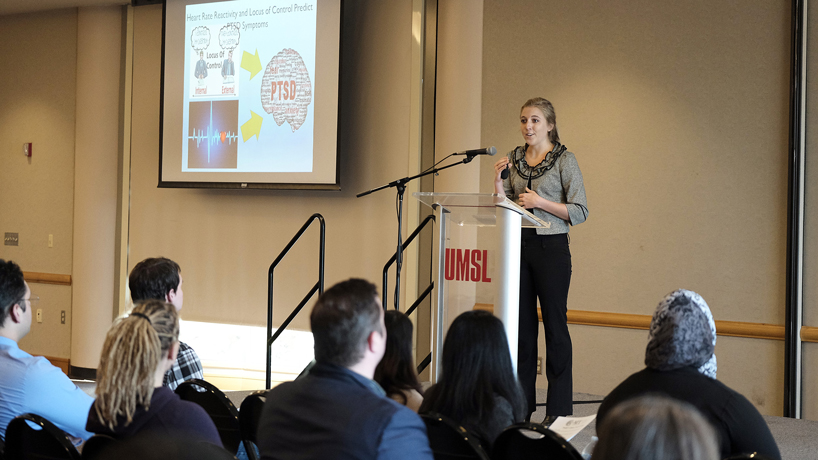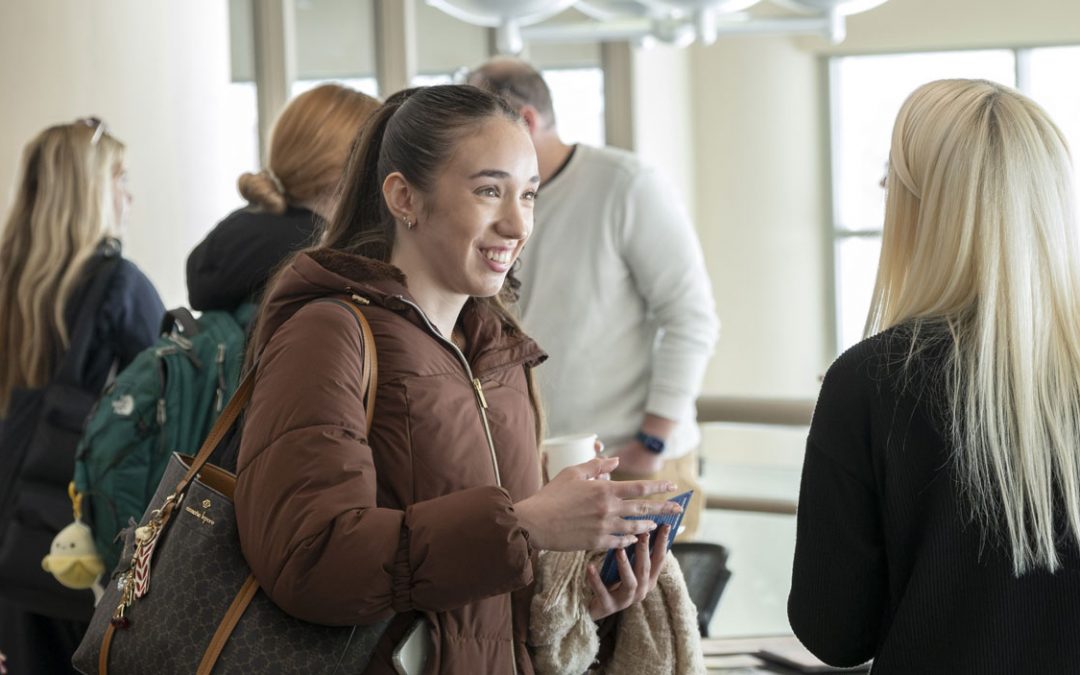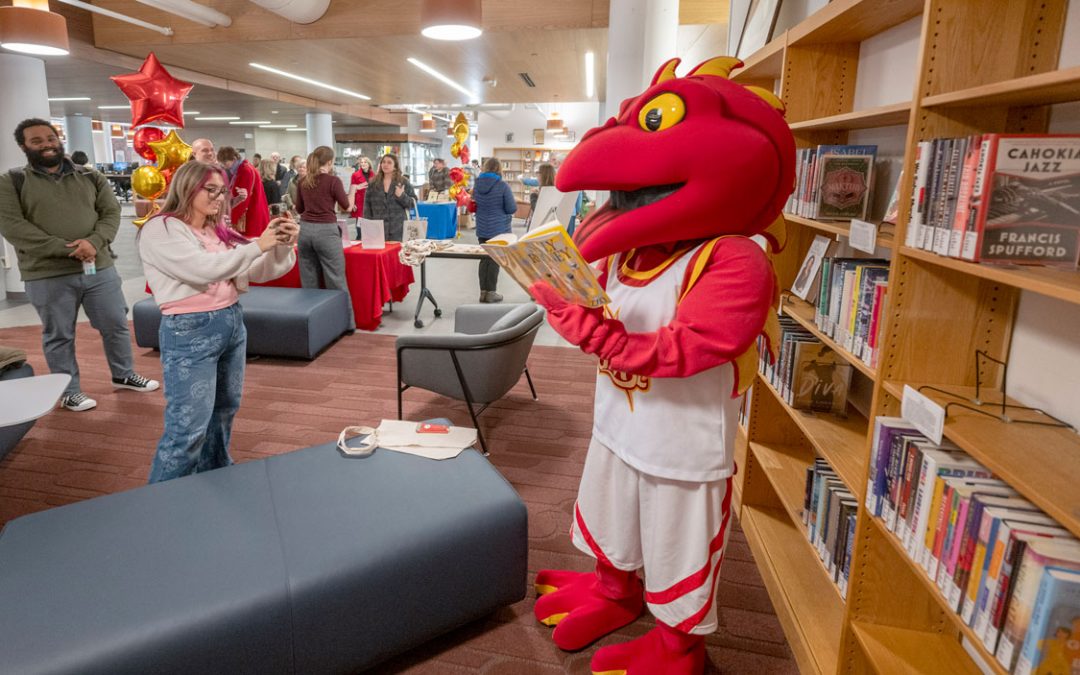
Nine master’s degree and PhD candidates from across several disciplines competed in the Three Minute Thesis competition. Pictured (from left) in the front row are Mike Deckard, Anthony Fischer, Stephan Germann, Sydney Harris and Rebecca Meza, and in the back row are Reigna El-Yashruti, Mari Jaramillo, Kruti Surti and Ibitsam Al Badri. (Photos by August Jennewein)
How does an up-and-coming scholar cram hours of study and practice into a three-minute presentation?
Furthermore, how do they manage this feat while rendering topics such as crime ecology, silafluorenes and post-traumatic stress disorder relatable to a general audience?
Although there’s no silver bullet, University of Missouri–St. Louis graduate students Sydney Harris, Stephan Germann and Michael Deckard all rose to the challenge on Nov. 4 as they competed in the Three Minute Thesis contest. They presented original research to a crowd of peers gathered in the Millennium Student Center Century Rooms.
While the prospect of presenting complex research under a strict time limit with only the aid of a single slide could be daunting to some, Harris took this aspect in stride and focused on overcoming nerves.
“Speaking in public makes me so nervous. I’m even a little nervous doing this interview right now,” said Harris, candidate for a master’s degree in behavioral neuroscience. “I usually like being in the lab more, on the research side of things, but Mike Griffin, my adviser, my labmates Rebecca and Brittany, and my cohort have helped me so much with practicing presentations and finding confidence in myself.”
The practice paid off as she took first place in the competition for sharing her research on how locus of control and heart-rate reactivity serve as predictors for long-term PTSD symptoms.
“There’s not a lot of literature on the significant predictors of PTSD, and I think this is very applicable to the real world,” Harris said. “PTSD can come in many forms. Military personnel and survivors of domestic violence and natural disasters can all benefit from having more treatment options.”
Deckard, the third-place winner and a criminology PhD candidate, managed nerves by taking deep breaths and slowing his heart rate. He believes keeping a cool head has helped him stay focused during the more than a dozen ride-alongs he has put in with St. Louis Metropolitan Police Department to better understand how crime concentrates in micro-geographic places.
“Crime is really misunderstood in the United States. More and more people are saying crime is out of control, but it’s at the lowest level it has been in decades,” Deckard said. “My research analyzes to what degree crime is concentrated in certain places. In some neighborhoods, it might be one street corner, one house or one apartment building that is generating all of the crime. If the goal is to reduce crime and make our cities safer, I think that’s really important to understand where it’s happening.”
Germann, the second-place winner, relied on a strong start to best get his points across. Once he got the first two or three words out, it was easy for him to explain the usefulness of the silafluorenes compounds he is creating.
“These compounds are really good at emitting light when they’re exposed to a UV lamp, and since they’re organic, they may be used to make flexible light emitting diodes,” Germann said. “In the future, OLEDs might be used in wearable electronics. If you need a screen that can bend, that’s where these compounds could be useful.”
Wesley Harris, interim dean of the graduate school, and Amy Banken, academic programs coordinator, brought the competition to UMSL and hosted the event. Professors Jennifer Siciliani, Teresa Thiel and Elaine Doherty judged the contestants, basing their decisions on the criteria of oration, creativity, clarity and research quality.
Thiel believes conveying academic research to the general public should be a key component of graduate studies.
“Increasingly, it is important for academics to be able to explain the significance of their research to a general audience, and this skill is often not taught as part of a graduate education program. This competition helps our students learn this important skill,” she said.
Doherty is happy to say that Harris was able to exemplify the usage of this skill set.
“Sydney captured the spirit of the Three Minute Thesis competition with her enthusiasm and by the creative and non-technical way that she engaged the audience while remaining grounded in her scientific research,” said Doherty.
While the winners found the opportunity to share their work with a wider audience a pleasure in and of itself, they also received cash awards for their participation. Harris, Germann and Deckard received $500, $300 and $200, respectively.
Though their research shares the common thread of aiming to better society, the winners have different plans for their cash awards.
Harris intends to fund research on the financial crisis in Greece. Deckard said he might buy a new suit or pair of shoes.
And Germann had only this to say: “Let’s be honest: It’s going to groceries. Maybe I’ll splurge and get myself a nice case of beer.”
The Three Minute Thesis competition originated at the University of Queensland in Australia as a way to celebrate the exciting research conducted by graduate students. Now in its seventh year of operation, the competition has spread to 350 universities across more than 18 countries worldwide.
As the winner of the local UMSL competition, Harris has the chance to advance to the regional Three Minute Thesis competition.
















